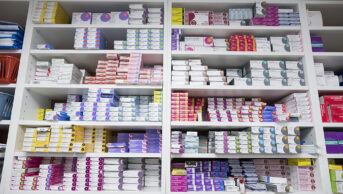
Shutterstock.com
Emerging reports that some smaller pharmaceutical wholesalers and independent pharmacist wholesalers could be manipulating the markets to cause unprecedented drug price rises are deeply concerning.
Difficulties obtaining hundreds of drugs have resulted in thousands of community pharmacists ending 2017 with the very real prospect of severe financial hardship as they are forced to pay extortionate prices for some of the most common generic medicines.
The Pharmaceutical Services Negotiating Committee (PSNC) has reported numerous calls from pharmacists struggling to get hold of medicines. Drugs in short supply include the antipsychotic drug quetiapine, which by October had risen 4,221% above the drug-tariff price from £1.62 to £70.00 for a 60-pack of 100mg tablets; schizophrenia treatment chlorpromazine which had risen by 2,545%, from £1.55 to £39.45 for a 28-pack of 25mg tablets; and the epilepsy drug levetiracetam, which has seen a 1,389% rise from £2.76 to £41.10 per 60-pack of 500mg tablets. There are many more examples.
Various reasons have been put forward for the price rises, including Brexit and supply problems after manufacturing licences were temporarily withdrawn from Indian drugmaker Dr Reddy’s in India and Luton-based pharmaceutical company Bristol Laboratories, following an inspection by the European Medicines Agency (EMA) in August 2017 that found neither company had complied with ‘good manufacturing practices’.
However, several sources, including the Healthcare Distribution Association (HDA), the British Generic Manufacturers Association and large wholesaler Sigma, have told The Pharmaceutical Journal they believe that some of the smaller wholesalers and independent pharmacist wholesalers may have been ordering and stockpiling excessively large quantities of the more common generic medicines, causing shortages and then waiting for concessionary prices to be announced before releasing them into the market at signficantly inflated prices.
If this is the case, there must be an urgent investigation by the Department of Health to ensure sufficient supply of essential medicines.
The Medicines and Healthcare products Regulatory Agency (MHRA), which is responsible for issuing licences to wholesalers, has stated that it would normally only investigate if drugs were being exported abroad leaving a shortage of medicines in the UK. It is the responsibility of the Department of Health (DH) to consider drug shortages generally, and the PSNC’s responsibility to look at prices, they said.
The situation worsened further in November when the PSNC asked the DH for concessionary prices on 97 medicines. But by 5 December, the date community pharmacists were required to submit their prescription bundles, DH had agreed concessionary prices on just 38 of those products.
It is the first time that price concessions have not been settled in the month they were applied for and comes as pharmacists also grapple with financial pressures caused by the funding cuts and changes to reimbursement for category M medicines, used to set the reimbursement prices of more than 300 medicines and the principal price adjustment mechanism to ensure the delivery of the retained margin guaranteed as part of the contractual framework.
At the time of going to press, the PSNC had responded to concessionary prices proposed by DH for a further 52 of the outstanding drugs, but no final decision had been reached.
As a result, thousands of pharmacists have been left having to pay high prices for December supplies at the end of this month while not knowing if they will be fully reimbursed for the drugs they purchased in November. One independent community pharmacy owner in west London told The Pharmaceutical Journal that she had never known such a bad situation in her 30 years of practice.
She said she was so anxious about the impact it was having on her business that she was repeatedly checking the PSNC website for updates, adding that she was currently operating at a loss and would not be able to continue on that basis for much longer.
The overall cost to the NHS is also unsustainable. Researchers from Oxford University’s Evidence-Based Medicine DataLab have reported that the excess cost of concessionary prices is now hitting £50m per month.
Analysis of October’s agreed concessionary prices estimates that an extra £56m was spent on concession-priced drugs in that month, putting the total increase in cost to the NHS from concessionary prices at £233m since April 2017.
If the situation continues in the same vein, and November’s debacle is suggesting it could, the extra £350m promised to the NHS by Chancellor Philip Hammond in the Autumn Budget to help with winter pressures will be wiped out by this alone.
There could be some hope on the horizon if proposed government regulations, which form part of the Health Service Medical Supplies (Costs) Act 2017, requiring manufacturers, importers and wholesalers to provide quarterly information about sales and purchases of generic medicines and special medicinal products, come into force.
The regulations, the subject of consultation between August and November 2017, would enable DH officials to weed out smaller wholesalers who regularly buy large supplies of generic medicines from the larger wholesalers and hold on to them until the price is right.
The DH has acknowledged that the current situation is untenable, saying it recognises that there needs to be a mechanism to ensure contractors are fairly paid when, for whatever reason, there are exceptional increases in the market that are not reflected in the drug tariff.
But until such time as DH holds companies to account, introduces a new payment system or new regulations uncover what is really going on in the market, pharmacists should continue to report shortages and be extra careful about which companies they source their medicines from.


